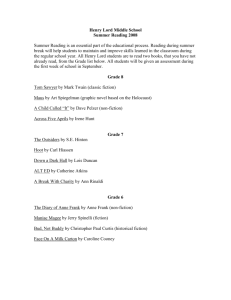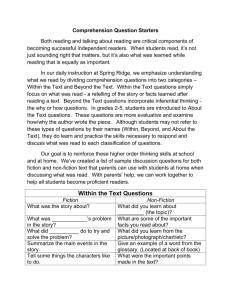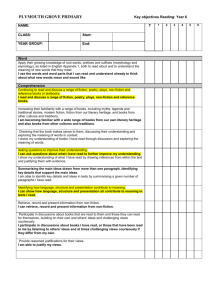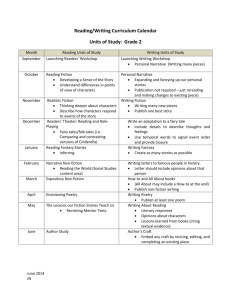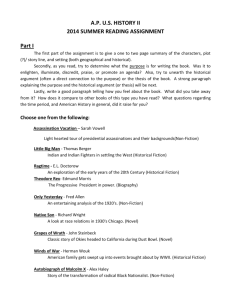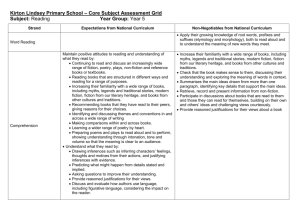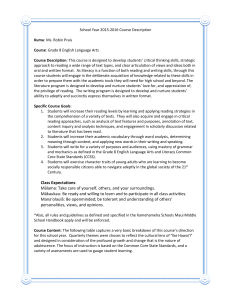HIS_310syl
advertisement
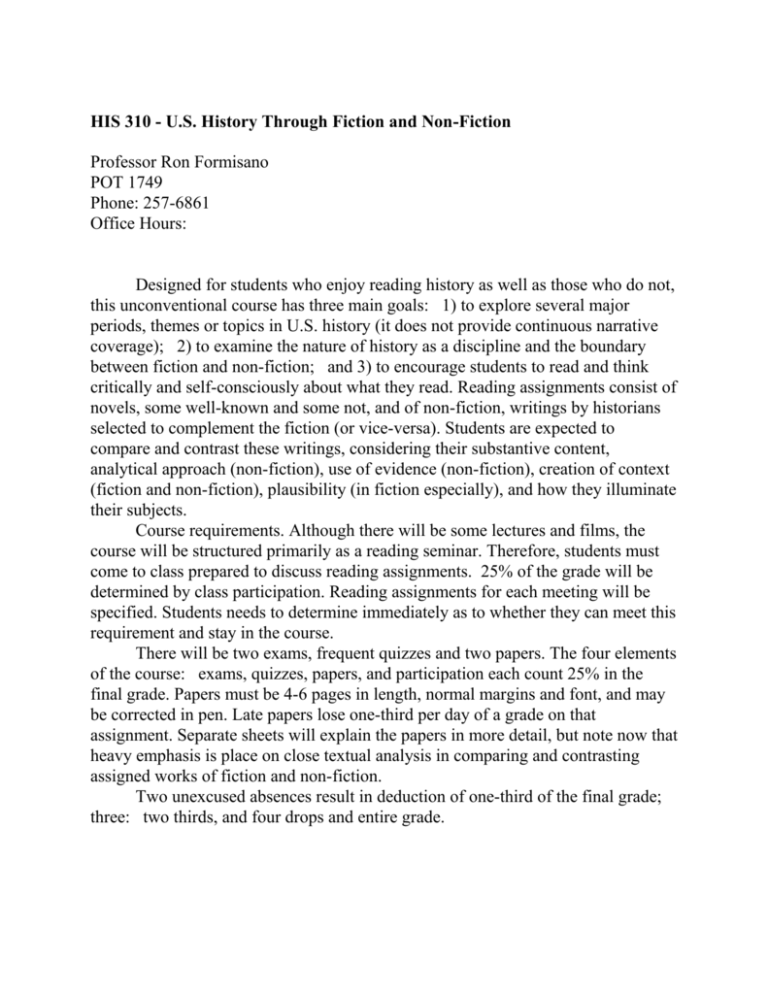
HIS 310 - U.S. History Through Fiction and Non-Fiction Professor Ron Formisano POT 1749 Phone: 257-6861 Office Hours: Designed for students who enjoy reading history as well as those who do not, this unconventional course has three main goals: 1) to explore several major periods, themes or topics in U.S. history (it does not provide continuous narrative coverage); 2) to examine the nature of history as a discipline and the boundary between fiction and non-fiction; and 3) to encourage students to read and think critically and self-consciously about what they read. Reading assignments consist of novels, some well-known and some not, and of non-fiction, writings by historians selected to complement the fiction (or vice-versa). Students are expected to compare and contrast these writings, considering their substantive content, analytical approach (non-fiction), use of evidence (non-fiction), creation of context (fiction and non-fiction), plausibility (in fiction especially), and how they illuminate their subjects. Course requirements. Although there will be some lectures and films, the course will be structured primarily as a reading seminar. Therefore, students must come to class prepared to discuss reading assignments. 25% of the grade will be determined by class participation. Reading assignments for each meeting will be specified. Students needs to determine immediately as to whether they can meet this requirement and stay in the course. There will be two exams, frequent quizzes and two papers. The four elements of the course: exams, quizzes, papers, and participation each count 25% in the final grade. Papers must be 4-6 pages in length, normal margins and font, and may be corrected in pen. Late papers lose one-third per day of a grade on that assignment. Separate sheets will explain the papers in more detail, but note now that heavy emphasis is place on close textual analysis in comparing and contrasting assigned works of fiction and non-fiction. Two unexcused absences result in deduction of one-third of the final grade; three: two thirds, and four drops and entire grade. Required books: Gore Vidal, Burr: A Novel (Vintage or Ballantine) Joseph J. Ellis, Founding Brothers: The Revolutionary Generation (Vintage–A Pulitizer Prize Winner) William Styron, The Confessions of Nat Turner K.S. Greenburg, ed., Confessions of Nat Turner and Related Documents [primary sources] (Bedford/St. Martin) Michael Shara, The Killer Angels (Ballantine) James M. McPherson, Ordeal By Fire, Vol. 2, The Civil War (Knopf) OR: Gary W. Gallagher, The Third Day at Gettysburg and Beyond (University of North Carolina Press) E.L. Doctorow, Ragtime John M. Barry, Rising Tide: The Great Mississippi Flood of 1927 and How It Change America Robert Penn Warren, All the King’s Men Glen Jeansonne, Huey Long: Messiah of the Rednecks Mark C. Carnes, ed., Novel History: Historians and Novelists Confront America’s Past (and Each Other) (Simon and Schuster) Some Other Books Used Arthur Rogow, A Fatal Friendship: Alexander Hamilton and Aaron Burr (Hill & Wang) Simon Schama, Dead Certainties (Unwarranted Speculations) (Vintage) Houston A. Baker, ed., Narrative of the Life of Frederick Douglas (Penguin) Albion W. Tourgee, A Fool’s Errand: A Novel of the South during Reconstruction (Harper) Mark Twain & Charles Dudley Warner, The Gilded Age: A Tale of Today (Meridian) Fielding Burke [Olive Tilford Dargan], Call Home the Heart (Feminist Press) Michael Herr, Dispatches (Avon Books) Bobbie Ann Mason, In Country (Harper) Course Objectives/Learning Student Outcome: Upon completion of this course, a student should be able to: - appreciate the boundaries between fiction and non-fiction - be aware of main themes of U.S. history such as major ideologies, the character and interests of founding fathers, the nature of slavery and its relation to the Civil War, and the consequences of the Great Depression. - Evaluate a work of fiction for its plausibility and its insight into a larger historical subject. - Understand how a works of fiction and non-fiction about historical subjects are shaped by the issues and debates of the time when they were written.
